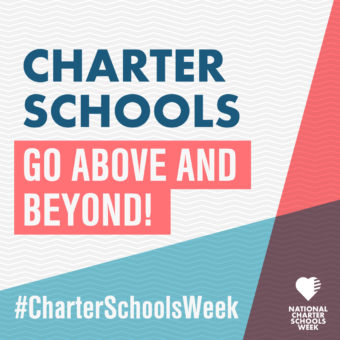It’s National Charter Schools Week — and in the midst of a particularly challenging period in American public education, the innovative, nimble approach epitomized by charters is more valuable than ever.
 The inherent promise of charters is that their autonomy allows them to pivot in real time. While we all need to work together to ensure that all public schools are equipped to serve students with disabilities, National Charter Schools Week is the perfect time to stop and highlight the best that charters can be.
The inherent promise of charters is that their autonomy allows them to pivot in real time. While we all need to work together to ensure that all public schools are equipped to serve students with disabilities, National Charter Schools Week is the perfect time to stop and highlight the best that charters can be.
Those outside the charter community may be surprised to learn that over 10% of students enrolled in charters nationwide have disabilities—and that students with disabilities in charter schools spend much more of their day in general education classrooms than their peers in traditional public schools (Rhim, Kothari, and Lancet, 2019).
Even more importantly, charter schools are working actively to improve their ability to educate students with a full range of learning needs. Thanks to the support of the Bill and Melinda Gates Foundation, 10 charter management organizations (CMOs) running a total of 135 middle and high schools are joining together as a pilot community to identify and implement research-based best practices for educating students with disabilities. Importantly, this effort is particularly focused on reaching students in minority and low-income communities where students with disabilities have historically faced additional hurdles in receiving the supports they need.
Individual schools are also taking it upon themselves to reach their most vulnerable students. Mott Haven Academy Charter School in the Bronx works specifically with students in the child welfare system, using an individualized, trauma-sensitive approach. Their positive school culture and behavior supports have worked particularly well for students with disabilities and have led to improved disciplinary outcomes.
In California’s San Fernando Valley, the CHIME Institute has created a model for schools across the country based on fully inclusive, co-taught classrooms where students with disabilities, as well as English Language Learners, learn alongside their peers without disabilities and native English speakers. A full 20% of CHIME’s students have disabilities, and the percentage of students with moderate to severe disabilities is more than five times the state average. The secret sauce that makes this work? Careful planning and intense collaboration.
When Collegiate Academies of New Orleans and Baton Rouge started as a single school, Abramson Science Academy, it met immediate success. But founder Ben Marcovitz, himself the father of a child with a brain injury, realized that the strict, college-preparatory curriculum left diverse learners at a disadvantage. He acted immediately, adopting restorative justice programs and considering students with disabilities from the start as that single school expanded into a network. Today, Collegiate Academies not only boasts intervention classes and a specialized curriculum for students with behavioral challenges, it also runs a postsecondary program, Opportunities Academy, for students with more severe disabilities.
These models for success are not only found within the walls of charter schools. Charters are incubators for growth, and the lessons learned there are rapidly percolating across America’s traditional public schools. Two of the most impactful education books of the past decades, Paul Bambrick-Santoyo’s Leveraging Leadership and Doug Lemov’s Teach Like a Champion, came out of the Uncommon Schools Network, as did the innovative Relay Graduate School of Education. These books, found on school administrator’s shelves across the country, have provided thousands of districts and educators with roadmaps for school turnaround and for enabling all students to achieve.
As educators across the nation navigate the challenges of COVID-19, we are hearing from these school leaders and many more that these preexisting structures based on inclusion, individualization, and communication have laid the groundwork for a swift, effective transition to remote learning. Charter leaders are going above and beyond, working day and night to ensure that their students have access to the internet and adult supervision and that their families are able to meet their basic needs. This National Charter Schools Week, more than ever, we are proud to partner with and support the immense efforts of this community as it strives to educate students with disabilities.
Comments are closed.